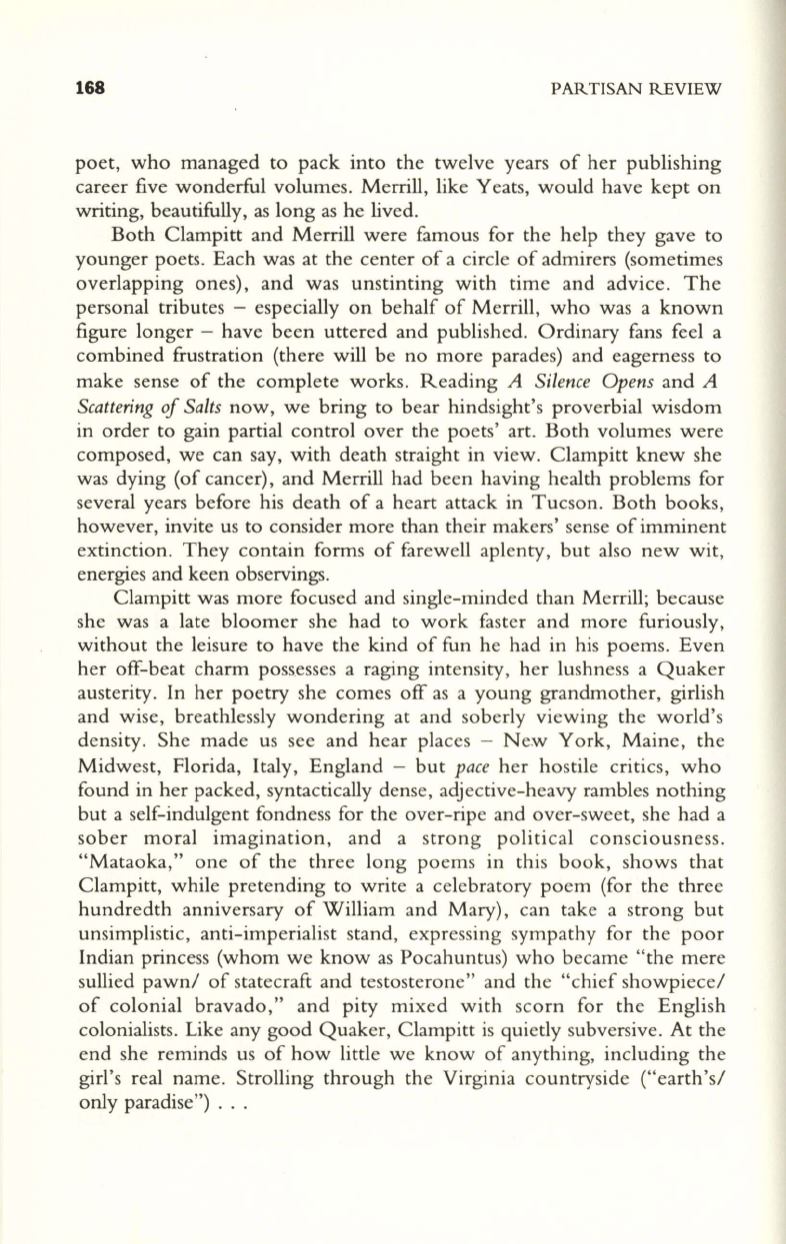
168
PARTISAN REVIEW
poet, who managed to pack into the twelve years of her publishing
career five wonderful volumes. Merrill, like Yeats, would have kept on
writing, beautifully, as long as he lived.
Both Clampitt and Merrill were famous for the help they gave to
younger poets. Each was at the center of a circle of admirers (sometimes
overlapping ones), and was unstinting with time and advice . The
personal tributes - especially on behalf of Merrill, who was a known
figure longer - have been uttered and published. Ordinary fans feel a
combined frustration (there will be no more parades) and eagerness to
make sense of the complete works. Reading
A Silence Opens
and
A
Scattering of Salts
now, we bring to bear hindsight's proverbial wisdom
in order to gain partial control over the poets' art. Both volumes were
composed, we can say, with death straight in view. Clampitt knew she
was dying (of cancer), and Merrill had been having health problems for
several years before his death of a heart attack in Tucson. Both books,
however, invite us to consider more than their makers' sense of imminent
extinction. They contain forms of farewell aplenty, but also new wit,
energies and keen observings.
Clampitt was more focused and single-minded than Merrill; because
she was a late bloomer she had to work faster and more furiously,
without the leisure to have the kind of fun he had in his poems. Even
her off-beat charm poss.esses a raging intensity, her lushness a Quaker
austerity.
In
her poetry she comes off as a young grandmother, girlish
and wise, breathlessly wondering at and soberly viewing the world's
density. She made us see and hear places - Ne.w York, Maine, the
Midwest, Florida, Italy, England - but
pace
her hostile critics, who
found in her packed, syntactically dense, adjective-heavy rambles nothing
but a self-indulgent fondness for the over-ripe and over-sweet, she had a
sober moral imagination, and a strong political consciousness .
"Mataoka," one of the three long poems in this book, shows that
Clampitt, while pretending to write a celebratory poem (for the three
hundredth anniversary of William and Mary), can take a strong but
unsimplistic, anti-imperialist stand, expressing sympathy for the poor
Indian princess (whom we know as Pocahuntus) who became "the mere
sullied pawn/ of statecraft and testosterone" and the "chief showpiece/
of colonial bravado," and pity mixed with scorn for the English
colonialists. Like any good Quaker, Clampitt is quietly subversive. At the
end she reminds us of how little we know of anything, including the
girl's real name. Strolling through the Virginia countryside ("earth's/
only paradise") ...


